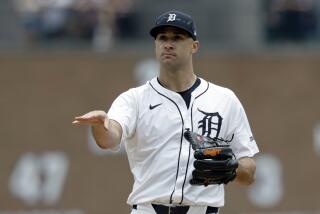Griffey Cuts Red Tape
- Share via
Say this much for sophomoric Junior: The magic he does with a bat and glove is nothing compared to how he wields a hammer.
The one he held firmly at Seattle Mariner heads for three months has been tucked away.
The hijacking is over. The blackmail is complete.
Ken Griffey Jr. was ransomed to the Cincinnati Reds Thursday for four unmarked players.
One of them is Mike, but it’s not Piazza.
Another is Brett, but it’s not George.
There’s a Derek, but no Jeter.
And, yes, the Reds are giving the Mariners a Perez. But he’s Antonio, not Tony.
One of baseball history’s red-letter trades turned into a blue-light special Thursday, thanks to yet another athlete with designer skills and discount ethics.
Their best player forced the Mariners to trade history for mystery, hamburger for Hamburger Helper, Cooperstown for Johnstown.
Sophomoric Junior wins.
His legacy loses.
Cincinnati wins, at least for the next few minutes.
The Mariners lose forever.
The point is not that Griffey asked to be traded.
That’s sad, and will forever separate him from the likes of Robin Yount, Cal Ripken Jr. and Tony Gwynn, but it’s not dishonorable.
So he got tired of Seattle after 11 seasons and wanted to be closer to home.
So he was afraid he wouldn’t hit as many homers in Seattle’s new open-air stadium.
So he was jealous of teammate Alex Rodriguez. So he didn’t think the team had a chance to win. So what.
The point is not that Griffey wanted to leave.
The point is, rather, how he decided to leave.
Being among baseball’s golden 10-and-5 class--10 years in the game and five years with the same team--he could veto any place he didn’t want to live.
Being a free agent next year, he could scare off any others.
He not only had a hammer, he had a sickle, and the Mariners’ future depended on the gentleness with which he handled both.
Being the centerfold ‘90s athlete, Griffey chose to pillage.
First, instead of trying to work quietly with the Mariners on a trade that could have been consummated from a position of strength, on Nov. 2 he issued a trade demand that immediately became public.
And his trade value dropped.
Then, instead of at least behaving as if he was open to all teams, giving the Mariners at least a pocketful of leverage, he issued a list of four.
And his trade value dropped some more.
Finally, when new Mariner General Manager Pat Gillick tried to save face by saying that Griffey might change his mind about the names on that list, Griffey angrily cut it to the Cincinnati Reds, period.
And his trade value disappeared.
Faced with either trading Griffey to the Reds or keeping this wall-climbing distraction on their team for one more season, the Mariners were lucky to receive more than a couple of Jack McKeon’s cigar butts in return.
Griffey had previously signed two new contracts during his career to remain in Seattle. He had helped save baseball and build a ballpark there. Whatever debts he accrued in that nurturing environment, he had long since repaid in full.
But one might think he still owed the Mariners the decency of not leaving them empty-handed.
Of course, in baseball, it’s never as one might think. It’s never about the team. It’s always about the player.
The strongest union in sports set the standards, and the players live down to them:
Be nice to me today or I’ll file a grievance. Trade me tomorrow or I’ll make your life miserable.
If you must lie about my age to get me off this island, do it. But if I become good, you will pay for those lies.
Eleven years? Millions of cheers? So what. Get me out of here, and do it now, and if you can only get a bucket of balls, well, happy hitting.
As best as anyone can figure, Griffey burned the Mariners because the trade talks embarrassed him, and negative public reaction surprised him, and because he could.
And baseball wonders why its sport is caught in an eternal pickle, running 80 feet forward, then 70 feet back.
Griffey opened his news conference in Cincinnati on Thursday by saying, “Well, I’m finally home.”
One problem. When he initially said he wanted to be closer to home, he meant his current Orlando home, not his childhood Cincinnati home.
His first choice was never Cincinnati. It was Atlanta, except the Braves didn’t think he would fit.
There was also much sweet talk at the news conference about how Griffey was so noble to turn down an eight-year, $138-million offer from the Mariners to sign a nine-year, $116.5-million deal with the Reds.
One problem. He took less money not because he wanted to play in Cincinnati, but because once Atlanta turned him down, he had no choice but to play in Cincinnati.
Small-market team, small-market money. And, if recent baseball history stands, the improved Reds still have only a small-market chance of winning the ring that Griffey claims he so covets.
So sophomoric Junior got his wish. Whatever that was.
Here’s hoping that several years from now, in the third inning on a soft summer night on the Ohio River, Ken Griffey Jr. puts a ball into the right-field seats that breaks Hank Aaron’s all-time home run record.
And here’s hoping that as he rounds third base, the two hippies chasing him around third base are wearing tie-dyed Mariner shirts.
*
Bill Plaschke can be reached at his e-mail address: bill.plaschke@latimes.com.
More to Read
Go beyond the scoreboard
Get the latest on L.A.'s teams in the daily Sports Report newsletter.
You may occasionally receive promotional content from the Los Angeles Times.











